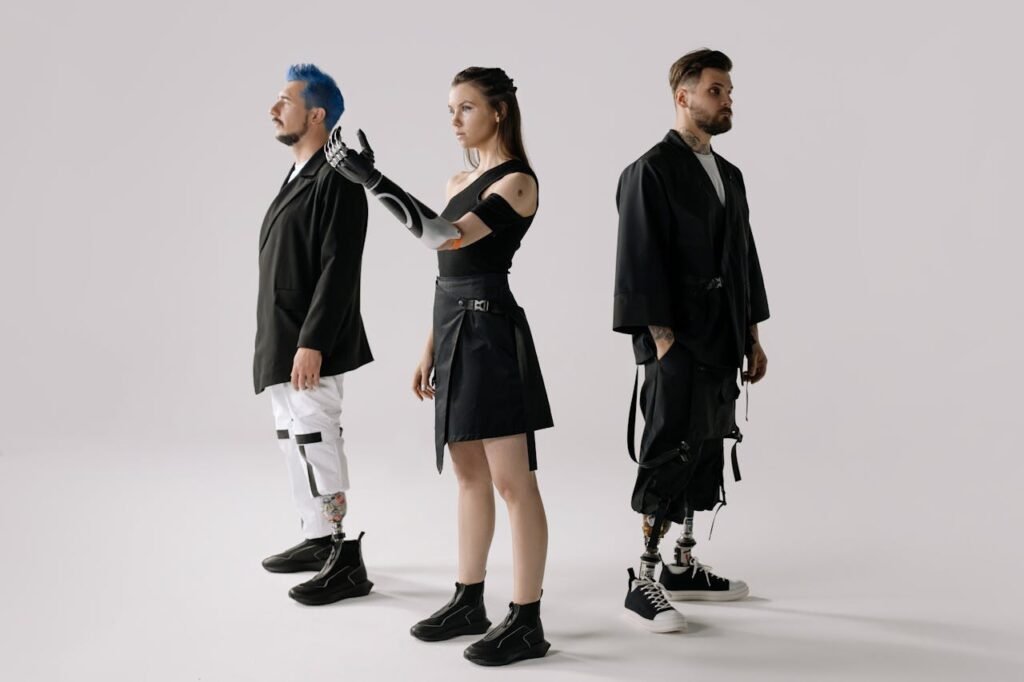For too long, the fashion industry has followed a rigid definition of beauty—one that often excluded people with disabilities. But today, a new wave of influencers is changing that narrative. Disabled fashion influencers are using their platforms to redefine beauty, challenge stereotypes, and create a more inclusive industry. Through bold fashion choices, confidence, and unapologetic self-expression, they are proving that style is for everyone.
Fashion has the power to make people feel seen and valued. And when disabled influencers step into the spotlight, they don’t just change how the industry views them—they inspire millions of people to embrace their own uniqueness. But how are they driving this transformation, and what impact is it having on the fashion world? Let’s take a deeper look.
Breaking Stereotypes in the Fashion Industry
For decades, the fashion industry promoted a limited vision of beauty—one that often ignored people with disabilities. But disabled fashion influencers are proving that style has no limits.
Moving Beyond Pity and Tokenism
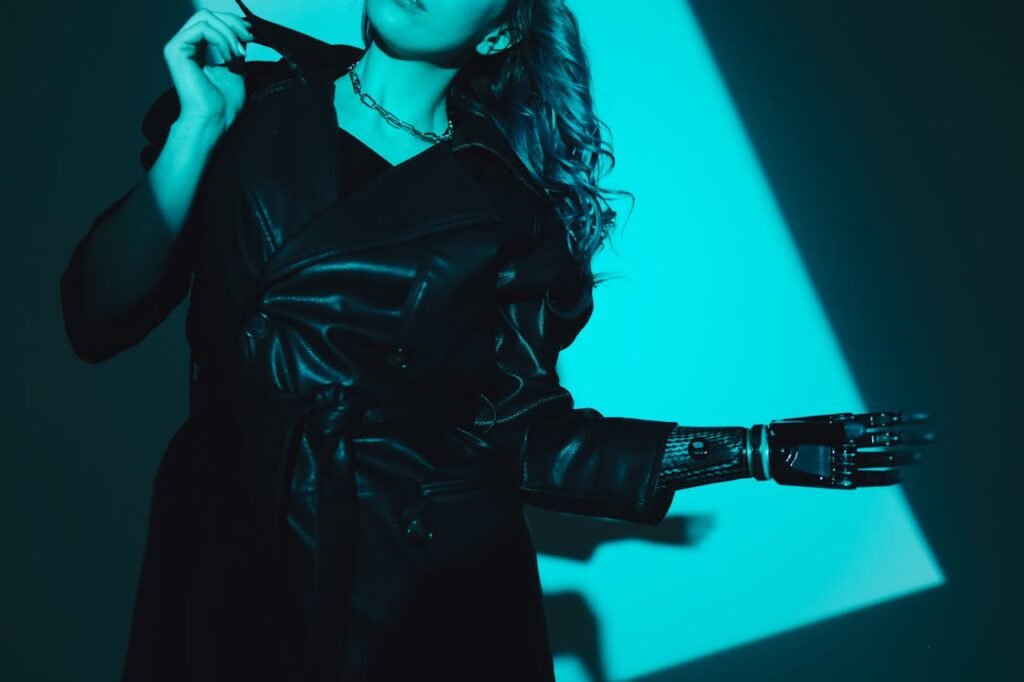
In the past, when disabled models were included in campaigns, it was often done as a token gesture. They were portrayed as “inspirational” rather than simply being seen as fashionable individuals. This approach made it seem like their presence was an exception rather than a norm.
Today, disabled fashion influencers are shifting this perspective. They are not asking for pity or special treatment—they are claiming their rightful space in the industry. By styling themselves with creativity and confidence, they show that fashion isn’t about meeting a certain standard but about self-expression.
Challenging Traditional Beauty Norms
Fashion has long been associated with symmetry, “perfect” body proportions, and able-bodied models. But disabled influencers are proving that beauty is far more diverse. Whether they use prosthetic limbs, mobility aids, or wheelchairs, they are redefining what it means to be stylish.
For example, influencers with prosthetic legs are choosing to highlight them rather than hide them, styling their prosthetics with vibrant colors, metallic finishes, or bold designs. Instead of viewing disability as something to be concealed, they turn it into a fashion statement. This challenges outdated ideas of beauty and encourages the industry to rethink how it defines elegance and grace.
Demanding Authentic Representation
Disabled fashion influencers are not satisfied with being occasional features in campaigns—they want ongoing, meaningful representation. They are calling on brands to include models with disabilities in regular advertising, not just in campaigns that focus on “inclusivity.” The goal is for diversity to become standard practice, not a marketing trend.
This push for change is working. More brands are now collaborating with disabled influencers, designing adaptive clothing, and hiring disabled models. This shift is not just about visibility; it’s about reshaping the industry to be truly inclusive at every level.
Embracing Adaptive Fashion as a Movement
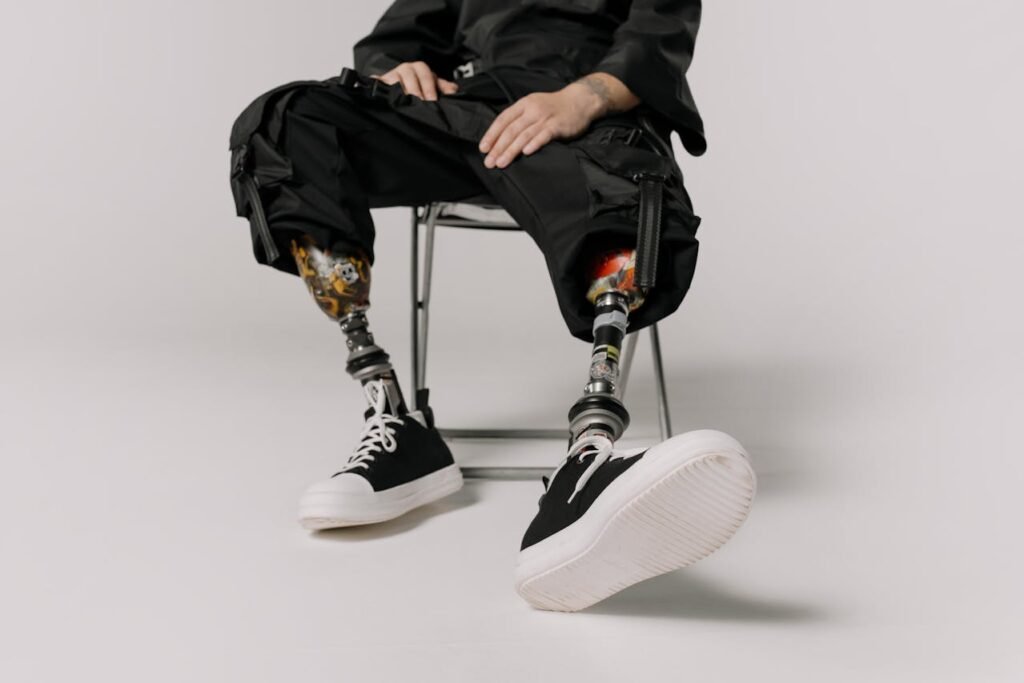
Adaptive fashion is more than just a trend—it’s a growing movement led by disabled fashion influencers who are pushing for style and accessibility to go hand in hand.
Making Fashion Functional and Stylish
For a long time, clothing designed for people with disabilities was more about function than style. Velcro fastenings, easy closures, and wheelchair-friendly cuts were created for convenience but often lacked aesthetic appeal. Disabled influencers have played a major role in changing this. They are proving that adaptive fashion can be both practical and stylish.
Many influencers work directly with brands to design clothing that meets their needs while still being fashionable. From one-handed zippers to magnetic buttons, adaptive fashion innovations are making dressing up easier without compromising on style. These changes are helping disabled individuals express themselves through fashion without limitations.
Encouraging Brands to Prioritize Accessibility
Disabled fashion influencers have used their platforms to call out brands that fail to consider accessibility in their designs. Their influence has led to major fashion labels creating collections that cater to people with different mobility needs. By sharing their experiences, influencers help brands understand what real accessibility looks like.
For instance, influencers with limb differences have highlighted the need for adjustable sleeve lengths, while wheelchair users have emphasized the importance of high-waisted jeans that stay in place while seated. These insights have led to the development of inclusive designs that cater to a broader audience.
Normalizing Disability in Fashion Conversations
When disabled influencers share their outfits, styling tips, and shopping experiences, they normalize the presence of disability in fashion. Their content is not just about “overcoming challenges”—it’s about celebrating individuality and self-expression.
By integrating disability into everyday fashion conversations, these influencers make it clear that style is for everyone. They shift the focus from “how do disabled people dress?” to “how can fashion brands be more inclusive for all customers?” This change in dialogue is essential for making the industry more representative of real-world diversity.
The Impact of Social Media in Redefining Beauty
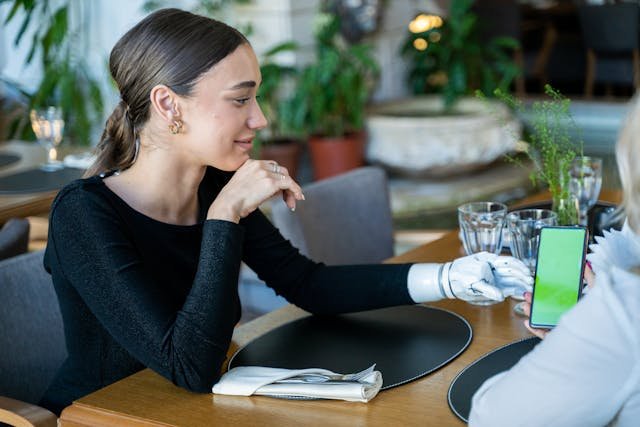
Social media has given disabled fashion influencers a platform to challenge outdated standards and inspire millions worldwide.
Owning Their Narratives
For years, people with disabilities were spoken about rather than spoken to in fashion media. Their representation was controlled by brands, magazines, and advertisers. Social media changed that.
Platforms like Instagram, TikTok, and YouTube allow disabled influencers to control their own narratives. They share their personal style, daily routines, and the realities of navigating the fashion world with a disability. By doing so, they bypass traditional gatekeepers and connect directly with audiences who value authenticity.
Building Communities and Inspiring Confidence
Fashion is not just about clothing—it’s about confidence. Many disabled individuals grow up without seeing people like themselves in media, which can make it harder to embrace their own beauty. Seeing influencers with disabilities rocking bold outfits and celebrating their unique features is incredibly empowering.
These influencers create communities where people with disabilities feel seen and supported. They share styling tips for prosthetics, wheelchair-friendly outfit ideas, and makeup techniques that work with different mobility needs. Their presence helps others feel more confident in expressing their personal style.
Holding Brands Accountable
Social media also gives influencers the power to demand change. When brands exclude people with disabilities, influencers and their communities call them out. Public conversations on platforms like Twitter and Instagram put pressure on companies to rethink their approach to inclusivity.
By amplifying their voices, disabled fashion influencers are pushing the industry to do better. They are not just passive consumers—they are active participants shaping the future of fashion.
The Future of Inclusive Fashion
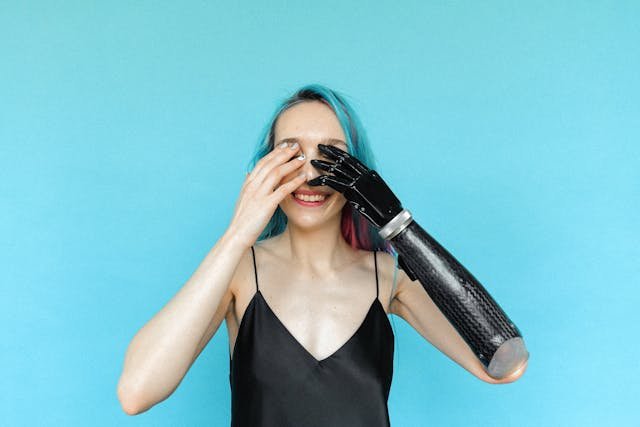
The rise of disabled fashion influencers is not just a passing trend—it is a cultural shift that is here to stay.
More Representation in Mainstream Media
As disabled influencers continue to break barriers, we can expect to see more representation in magazines, runways, and major fashion campaigns. The industry is slowly realizing that true beauty includes all body types, abilities, and experiences.
Fashion weeks are beginning to feature disabled models, and brands are creating long-term partnerships with influencers who bring fresh perspectives. These changes signal a future where inclusivity is not an afterthought but an essential part of fashion.
Increased Accessibility in Fashion Design
With more voices advocating for adaptive fashion, we will likely see a surge in stylish, accessible clothing. Brands that once ignored disability-friendly designs are now investing in research and development to create products that serve all customers.
From customizable prosthetic covers to fashion-forward mobility aids, the future of fashion is becoming more inclusive. And with disabled influencers leading the way, these innovations will continue to grow.
Empowering the Next Generation
Perhaps the most significant impact of disabled fashion influencers is the inspiration they provide to future generations. Young people with disabilities now have role models who prove that beauty is not limited to one standard. They can see themselves in the fashion world and know that they, too, belong.
By redefining beauty standards, these influencers are not just changing fashion—they are changing lives. And as their influence continues to grow, they will shape a future where style truly belongs to everyone.
How the Fashion Industry Can Further Support Disability Inclusion
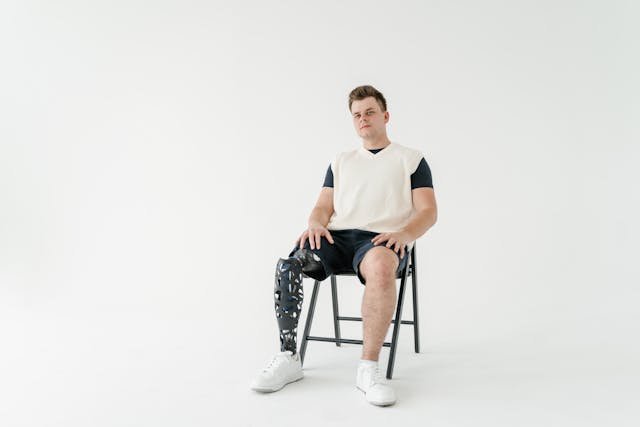
While progress has been made, there is still much work to be done. The fashion industry must take intentional steps to ensure that inclusion is not just a trend but a permanent shift.
Hiring More Disabled Designers and Decision-Makers
True inclusivity goes beyond featuring disabled models in campaigns—it requires having people with disabilities involved in the creative and decision-making processes. While brands have made strides in representation, most fashion collections are still designed without disabled individuals in mind.
To create truly inclusive designs, fashion houses and retailers should hire disabled designers, consultants, and executives. These professionals bring lived experience that enables them to craft clothing that is both stylish and functional. Their input ensures that adaptive fashion is not an afterthought but a key part of the design process from the very beginning.
Several brands have already started collaborating with disabled designers, leading to more thoughtful innovations such as seamless closures, adjustable hems, and stylish mobility-aid accessories. However, this needs to become the norm rather than the exception. When disabled voices are included at every stage of fashion creation, the industry will naturally become more inclusive.
Expanding Adaptive Fashion Beyond Niche Collections
Many mainstream brands have launched adaptive fashion lines, but these collections are often limited in size and availability. They are treated as special projects rather than integrated into regular product lines. This separation reinforces the idea that disabled consumers are a niche market, rather than an essential part of the fashion industry.
For real change, adaptive fashion should be available in the same way as any other clothing line. Stores should carry inclusive designs alongside standard collections, ensuring that disabled customers do not have to go out of their way to find accessible clothing. This approach normalizes disability inclusion and makes fashion shopping a seamless experience for all consumers.
Some retailers have begun incorporating adaptive designs into their main product lines, ensuring that stylish and functional options are available to everyone. This shift is essential for creating a truly inclusive fashion landscape.
Improving Accessibility in Retail Spaces and Online Shopping
Inclusivity in fashion is not just about the clothes—it’s also about the shopping experience. Many retail stores are not fully accessible to people with disabilities, making it difficult for them to browse and try on clothes comfortably. Narrow aisles, inaccessible fitting rooms, and high shelves all create barriers for disabled shoppers.
Retailers should take steps to improve physical accessibility, including adding wheelchair-friendly dressing rooms, lowering checkout counters, and ensuring that store layouts accommodate mobility aids. Staff training is also crucial—sales associates should be educated on how to assist disabled customers in a way that is respectful and empowering.
Online shopping also needs to be more inclusive. Many fashion websites lack accessibility features such as screen reader compatibility, image descriptions, and easy-to-navigate interfaces. By improving website accessibility, brands can ensure that all customers can browse and purchase clothing with ease.
The Role of Fashion Media in Promoting Disability Inclusion
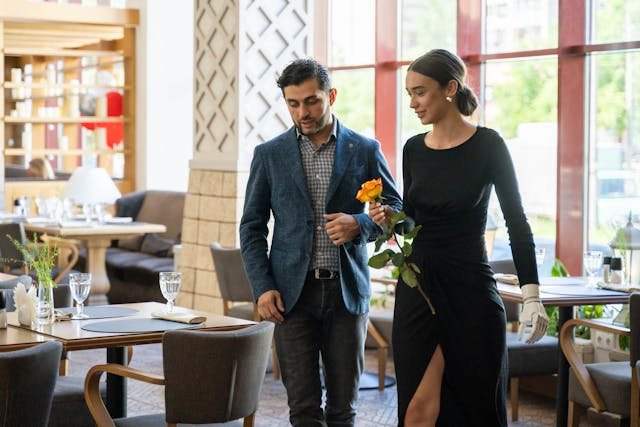
The fashion industry is heavily influenced by media—magazines, advertisements, runway shows, and influencer collaborations shape public perception of beauty. For true inclusivity, fashion media must do more than occasionally feature disabled models; it must integrate disability representation into every aspect of its storytelling.
Featuring Disabled Models Beyond “Inspiration” Stories
For years, when fashion magazines or campaigns featured disabled individuals, they were often presented as exceptional cases. The focus was not on their style or talent, but rather on their ability to “overcome” their disability. This kind of representation, while well-intentioned, separates disabled individuals from mainstream fashion narratives.
To create genuine inclusivity, fashion media must showcase disabled models, designers, and influencers as a normal part of the industry—not just as symbols of resilience. A model with a prosthetic leg should be featured in campaigns for high fashion, casual wear, and street style, just like any other model. They should not only appear in special “diversity” issues but in regular editorials and ad campaigns.
By normalizing disability representation, fashion media can help shift public perception, proving that disabled individuals are not an exception in the fashion world but an essential part of it.
Reframing Language and Storytelling
The way disability is discussed in fashion media matters just as much as visual representation. Many articles and campaigns still use outdated, patronizing language when talking about disabled individuals. Words like “brave,” “inspirational,” and “heartwarming” may seem positive, but they often frame disabled people as if they are extraordinary simply for existing.
Instead, fashion media should highlight disabled individuals for their creativity, innovation, and unique style—just as they do with any other influencer or model. Their disability should not be the main focus of the story unless they choose to center it.
For example, instead of writing an article titled “How This Model Overcame Disability to Walk the Runway,” a better approach would be “How This Model Is Changing the Future of Fashion.” The second title emphasizes the person’s impact rather than their disability. Language like this makes a significant difference in how disability is perceived.
Incorporating Disability into Mainstream Fashion Events
Fashion weeks, award shows, and industry conferences play a huge role in shaping trends and setting standards. Historically, these events have excluded disabled individuals, both on and off the runway. However, this is beginning to change.
Some major fashion weeks have started including disabled models, but the industry must go further. Designers should cast disabled models not just as a statement, but as a standard part of their shows. Journalists should cover adaptive fashion developments with the same enthusiasm as they do new trends. Influencers with disabilities should be invited to front-row seats at fashion week, just like their able-bodied counterparts.
By making these changes, fashion media can send a clear message: disability is not a niche topic; it is an integral part of the fashion world.
Conclusion
Disabled fashion influencers are doing more than just making statements—they are rewriting the rules of the fashion industry. By challenging outdated norms, pushing for adaptive design, and using social media to amplify their voices, they are proving that beauty is diverse, fashion is for everyone, and no one should be left out of the conversation.
At Robobionics, we believe in innovation that empowers people. Just as we work to make prosthetics accessible and functional, these influencers are making fashion more inclusive. And together, we can create a world where every individual—regardless of ability—feels confident, stylish, and seen.



